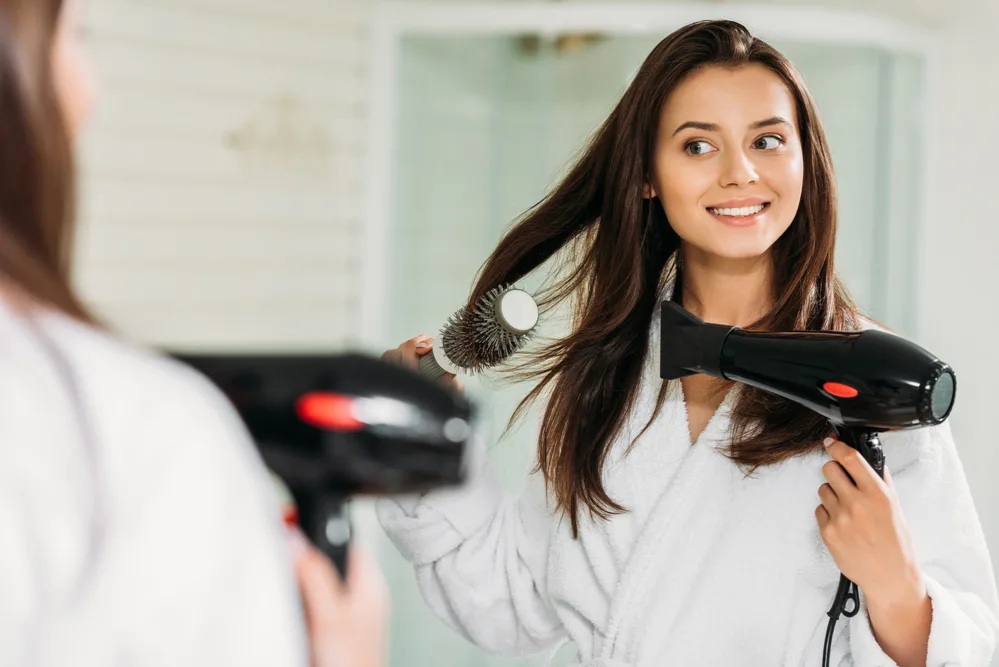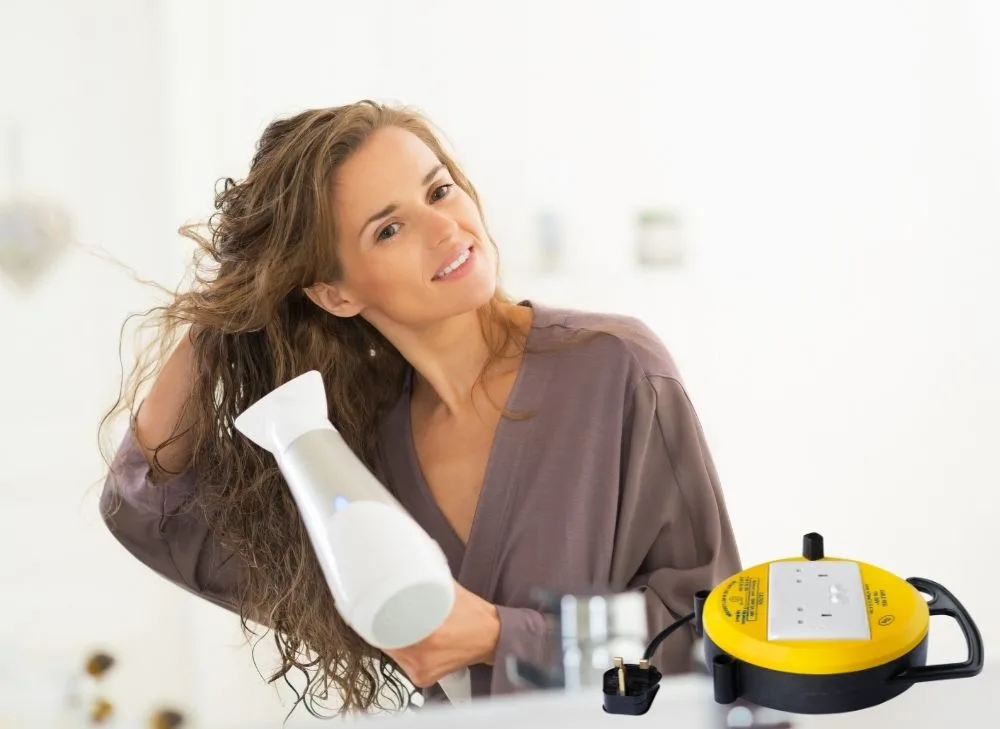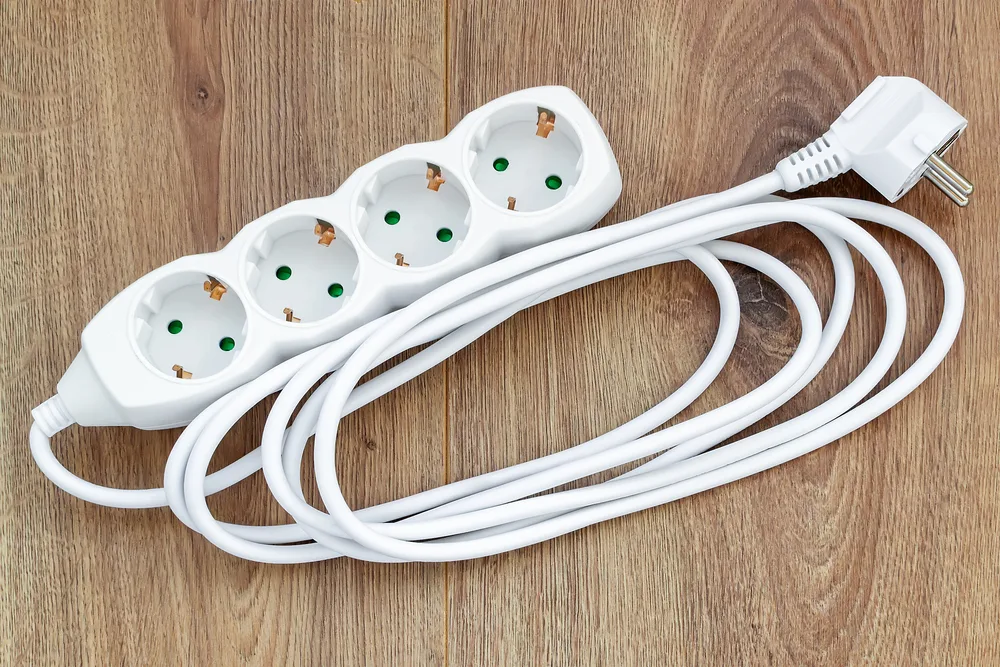It’s incredibly inconvenient when the cord for one of your appliances just isn’t long enough. I myself have rearranged my entire kitchen just to plug my new coffee maker with a tiny one-foot cord into the wall. When it comes to a hair dryer, however, you’re likely using it in the bathroom where you may only have one outlet available. What do you do, then?
If you’re here, it’s probably because you’re wondering about whether or not you can just grab an extension lead, plug everything in, and blow your problems away. Well, technically you can—but if you aren’t careful to match your cord to your dryer, this can also be dangerous.

On average, hair dryers are rated at 1875 watts. This high power rating is because they provide heat. It is risky to use extension leads with hair dryers unless certain that the cable has a rating to match or exceed that of the hair dryer. A 12 AWG or lower cable will usually be fine, but always check first.
Hair Dryers Can Be Used With Extension Leads
Extension leads are a tricky matter when it comes to any heat-producing appliances like hair dryers, tumble dryers, space heaters, etc. This is because these appliances pull a lot of power.

So, the short answer is that yes, a hair dryer can be used with an extension cord. However, this does not necessarily mean that is always the case.
Not every hair dryer will be compatible for use with an extension cord, and not every extension cord is compatible for use with a hair dryer.
Compatibility is determined by power ratings. To be more specific, both the appliance and the cord must have the same power rating.
Hair dryers generate a lot of heat, and in order to do this, they require quite a bit of power. A typical dryer can use up to 1875 watts at maximum settings, meaning you’ll want to make sure you use an extension cord that is rated for handling at least that much power.
If you’re unsure about how to compare watts, amps, and volts, we’ll provide some simple calculation formulas further down in the article.
What Happens if They Don’t Match?
You may be wondering what would happen if you were to just brave the potential consequences of not matching your appliance’s power rating to that of your extension lead.
To be blunt, nothing good can come of taking that risk—in fact, it could be incredibly dangerous. Let’s take a look at why that is.

An extension cord is rated based on how much power it can safely carry, which in large part depends on the length and thickness of the wire, what kind of wire is used, and the quality of the insulation.
As a general rule, a thicker gauge of wire is able to handle more power at once, but the longer the wire, the lower its carrying capacity gets. A hair dryer is a high-power device. While you should still look at the actual numbers to be safe, it’s likely that a compatible cord will be thicker and on the shorter end.
If you use an extension lead that is not properly equipped to handle the level of power that your hair dryer (or any other appliance) requires, you run the risk of running your wire too hot or losing too much voltage.
The consequences of this can be anything from inconvenient to life-threatening when not handled correctly. To clarify, you could simply burn out the motor of your hair dryer, but you could also melt the insulation of your cord, or even start a fire.
Hair Dryers Pull Quite a Lot of Power
As mentioned earlier, many hairdryers use up to 1875 watts of power, or 15 amps. Now, this is a very large amount of power. Why do such small devices need so much energy to run?
Well, In order to create a constant stream of hot air, the hair dryer must suck in large amounts of air very quickly while also heating it in an instant. Needless to say, this uses a lot of energy.
Here are some examples of hairdryers and their required wattage.
- Travel Smart by Conair (amazon link) is a compact hair dryer that only uses 1200 watts. This is on the low end for a dryer, which opens up your options for compatible extension leads.
- INFINITIPRO by Conair (amazon link) is a salon grade dryer that uses 1875 watts, as is standard.
- REVLON Compact Travel Dryer (amazon link) is yet another compact, travel size dryer, although this one packs a bigger punch with a typical 1875 wattage.
- Xpoliman Pro Ionic Salon Hair Dryer (amazon link) is another salon quality dryer, but with a wattage of 2000 watts. This is a dryer that might run great, but may give you a hard time when looking for a compatible extension lead.
Extension Lead Options for Hair Dryers
Many extension cords that are rated to handle a hairdryer are meant for outdoor use.
While it is perfectly alright to use an outdoor extension lead indoors, outdoor cords are often very, very long and unwieldy.
Here are a few options for an extension cord that should be able to handle most hair dryers.
- FIRMERST 6 Feet Flat Plug Low Profile Extension Cord (amazon link) is rated to handle up to 1875 watts, and at only 6 feet long should offer you plenty of length without taking up excess space or creating a tripping hazard.
- Clear Power 3ft Grounded Flat Plug Extension Cord (amazon link) is another option that can take up to 1875 watts, and at 3 feet may be an even better choice if you only need a tiny bit of extra length.
Both of the listed cords are just capable of handling up to 1875 amps, which again should be able to pair safely with the majority of dryers. However, if you own a higher voltage hair dryer, you may have a harder time finding a strong enough cord.
You also have to make sure that the extension is grounded as this is important for hair dryers that are both powerful and often used in moist environments, i.e., the bathroom.
How Do You Know the Extension Cord Rating?
You may have an extension cord at home that you don’t know the power rating of.

To confirm the power rating, simply examine the extension lead itself. Somewhere along the cord, you should find information printed about the AWG, or American Wire Gauge System. The lower the AWG number is, the thicker the wire and the more power it can handle.
Since hair dryers tend to run at about 1875 watts on the highest setting, you should be safe with a cord that is 12 AWG or lower. You can also always look up what the printed information means in regards to power ratings to confirm, just to be safe.
Watts, Amps, and Volts
If you need to match your power ratings, it can be easy to get confused when you have different information regarding your cord than you do for your appliance. Luckily, you can just put what information you do have into one of the following formulas to find your missing info and compare the cord and appliance.
- Amps x Volts = Watts
- Watts / Amps = Volts
- Watts / Volts = Amps
If you only have the AWG for your cord, you can simply look online to find how that translates into watts, amps, and volts.
Can You Plug Hair Dryers Into Power Strips?
Many power strips come with a few feet of extension, which may cause you to wonder if it’s alright to plug your hair dryer into a power strip instead of using an extension lead.
Unfortunately, this is a pretty dangerous thing to do as well.
The National Fire Protection Association warns that only one major appliance should be plugged into an outlet at a time, and heat-producing appliances (like hair dryers!) should not share an outlet with any other heat-generating appliances.
You might not consider a hair dryer a major appliance like you would with a fridge, but it is still a high-power heating appliance, and it’s better to be safe.
Even if you were able to safely plug your hair dryer into a power strip, you would be putting all the other plugs on the strip out of commission. Not only can that cause another inconvenience in itself, but this could make it easier for you to forget about only keeping the dryer plugged in when there are so many “available” plugs on the strip.
Essentially, this means the dryer should always either be plugged directly into the wall, or you should be absolutely certain that you use an extension cord that is made to handle the heat.
Sources
https://www.cnet.com/home/smart-home/not-enough-power-outlets/
https://energyusecalculator.com/electricity_hairdryer.htm
https://www.electrical101.com/extension-cords.html
https://www.ius.edu/environmental-health-safety/files/extension-cord-and-power-strip-safety.pdf
https://www.ius.edu/environmental-health-safety/files/power-cord-safety.pdf
